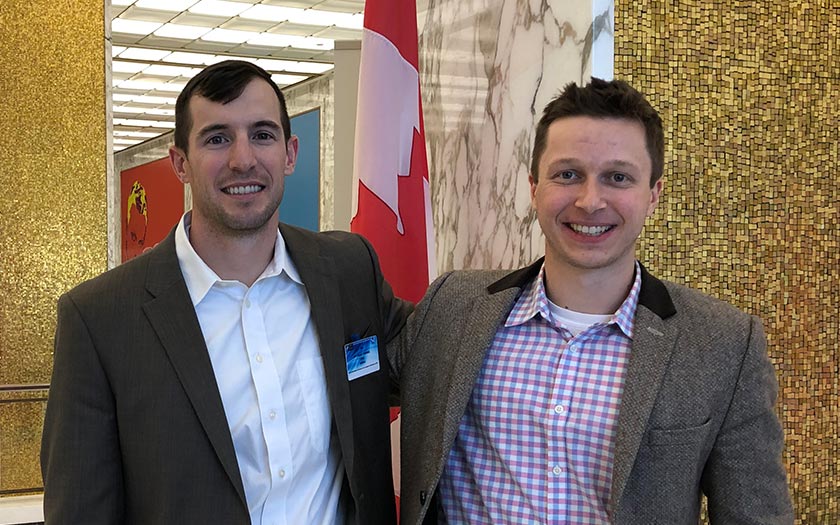
Ford School student Ryan Van Wie (MPP ‘20) and Jacob Walden (PhD candidate in political science) are the 2020 winners of the Peter Eckstein Prize for Interdisciplinary Research. The award celebrates the value of interdisciplinary research, which is critical in public policy.
Van Wie and Walden’s joint paper, titled “Excessive Force or Armored Restraint? Government Mechanization and Civilian Casualties in Civil Conflict,” drew upon conflict studies, psychology, econometrics, and policy research to develop a theory, empirically test hypotheses, and provide policy recommendations for defense procurement, doctrinal modifications, and rules of engagement training.
The pair of students have been researching civil conflict dynamics for the past two years but saw a disconnect between academic theories that warned against employing mechanized units and narrative accounts citing their effectiveness during Operation Iraqi Freedom. “We pursued this research project to better explore that puzzle,” said Van Wie. According to Van Wie, this work could not have been done without taking an interdisciplinary approach.
“There is a wide set of unanswered questions about the efficacy of mechanized units in reducing violence in counterinsurgency operations,” Walden said. “By engaging other disciplines, we were able to take theories from psychology and conflict studies and offer an explanation for violence and soldier behavior that hadn’t existed before. That's because scholars in those disciplines were approaching similar problems from a different angle than political scientists and policy scholars.”
From the abstract: Does increasing government mechanization result in higher levels of civilian casualties during counterinsurgency operations? The insurgency literature predicts that mechanized forces’ enhanced firepower capabilities will result in higher levels of civilian casualties. However, this view is challenged by counterinsurgency practitioners in Iraq who cite the effectiveness of mechanized forces in civil conflict environments. We propose a new theory detailing how disciplined, mechanized forces’ increased personal protection affords them decision space to apply greater restraint in tactical engagements. We test this theory using micro-data from Operation Iraqi Freedom and find mechanized units are associated with significantly lower civilian casualty levels compared to dismounted units.
The committee also awarded an honorable mention to: "Scenarios of Light Duty Vehicle Greenhouse Gas Emission Savings from Battery Electric Vehicle Market Penetration from 2020-2035" by Alex Maranville (MPP ‘20) and Ellen Hughes-Cromwick, PhD (former associate director of U-M Energy Institute).
Ford School students at all degree levels submitted work for consideration. A committee of four faculty reviewed 15 entries and assessed each on the strength of the multi- or interdisciplinary approach to the work, the quality of the work, and its potential for impact.
Photo caption: Van Wie and Walden after presenting at the 2019 NATO Operations Research and Analysis Conference in Ottawa, Canada.
Ryan Van Wie was commissioned as a US Army Infantry Officer in 2010 and has served overseas in South Asia, the Middle East, and Eastern Europe. Following graduation from the Ford School in May 2020, he is being assigned as an International Affairs Instructor at the United States Military Academy at West Point.
Jacob Walden is a PhD candidate in political science at the University of Michigan. His work focuses on counterinsurgency, American foreign policy, and legacies of conflict.
The Peter Eckstein Prize for Interdisciplinary Research and Policy Analysis is awarded to a Ford School student or group of students whose work exhibits the use of theories, concepts, frameworks, research methods or other tools from two or more disciplines in researching, analyzing, or furthering understanding of a topic, issue or debate related to public policy, domestic or international. The prize was established in 2019 by a gift from Peter Eckstein, who was a student of both economics and social sciences, and throughout his career saw the value in combining the two fields to explain economic phenomena.